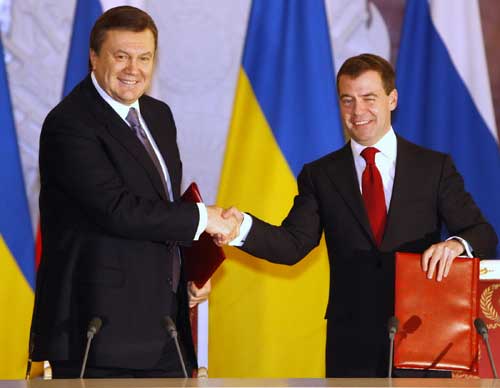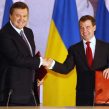
Salient Issues in Ukraine-Russia Relations and Yanukovych’s Moscow Visit
Publication: Eurasia Daily Monitor Volume: 7 Issue: 47
By:

Ukrainian President Viktor Yanukovych’s visit to Moscow on March 5 (see “Yanukovych in Moscow: More Than Balancing the Brussels Visit,” EDM, March 10) focused almost entirely on bilateral relations, practically overlooking or avoiding international issues. The following issues were discussed in public:
• Governance model: Yanukovych praised Moscow’s handling of the financial-economic crisis as a worthy example for Ukraine to follow. Political stability has helped Russia to cope better than Ukraine did with the crisis, he observed. “My task is now to catch up with Russia, bring our living standards, pensions and social assistance up to Russian levels,” the gaffe-prone Yanukovych pledged. Sarcastically he offered to send some Ukrainian “demagogues” (politikany, politikanstvo) to Russia, so that the Russian people could even better appreciate the stability they enjoy. When Yanukovych said at one point that he must await the formation of a new coalition, Medvedev retorted: “I do not need to form a coalition to resolve any problems” (BBC Monitoring, March 9).
According to the Levada Center’s latest surveys of Russian public opinion, only 8 percent believe that Ukraine is more democratic than Russia. Conversely, between 50 percent to 65 percent believe that Russia is more democratic than Ukraine and feel compassion for the country because it must live with uncertainty about election results (Vedomosti, March 9). Such findings spell the end of Western assumptions, and Moscow’s fears, that the Orange Revolution might have provided a democratic example to Russia.
• Language Policy: Responding to the Russian media’s leading questions, Yanukovych assured Moscow that he would keep his presidential campaign promise to implement the European Charter on Regional and Minority Languages. This will result in conferring official status to the Russian language (apparently on a par with Ukrainian) in many of Ukraine’s regions, particularly in the Party of Regions’ strongholds.
Following his return from Moscow, Yanukovych made an appearance at the shrine to Ukrainian national poet Taras Shevchenko, assuring Ukrainians that their language would alone retain the status of the state language on a country-wide basis, while Russian would receive official status in certain regions (Interfax, March 9). This will, however, not allay concerns about linguistic de-Ukrainization and re-Russification in Ukraine’s east and south, resulting from this measure. As a sop, Medvedev and Yanukovych have decided to hold a joint Taras Shevchenko Year in Ukraine and Russia.
• Russia-Ukraine Interstate Commission: created and co-chaired by Putin and Yushchenko while presidents, the commission has remained inactive. Some of the sub-commissions have met periodically, however, notably the one tasked to delimit the maritime border and discuss contentious issues related to the Russian Black Sea Fleet based on Ukraine’s territory. Both sides now intend to hold a full meeting of the Interstate Commission during the first half of this year in Kyiv, in connection with Medvedev’s planned visit there. Ahead of that event, the new Ukrainian government (if and when it is installed) will prepare an action plan for the commission’s consideration.
• Black Sea Fleet: Medvedev and Yanukovych agreed that bilateral consultations should continue as before, based on the 1997 agreements on the temporary stationing of the Black Sea Fleet on Ukrainian territory. Characterizing this as a very difficult and complicated problem, Yanukovych implied that it can ultimately be settled by the two presidents among themselves. At the news conference, he promised to help resolve the issue “in a way that would satisfy both Ukraine and Russia,” and even “very soon.” The first part of the answer merely echoes Yanukovych’s campaign rhetoric, when he suggested prolonging the basing agreement beyond the 2017 deadline. The “very soon,” however, is a disconcerting addendum, possibly presaging a quick deal to Ukraine’s detriment.
• NATO: Russian leaders had apparently hoped for an explicit Yanukovych statement that Ukraine will not seek NATO membership (Rossiyskaya Gazeta, March 9). At the press conference, a planted question attempted to goad Yanukovych into endorsing an anti-NATO referendum, signatures for which are currently being collected in Ukraine. Instead, Yanukovych merely declared that “Ukraine will develop its relations with NATO as a non-bloc state and in accordance with its national interests” (Interfax, March 5).
• Soviet Legacy Preservation: Medvedev and Yanukovych agreed to celebrate the Soviet “great patriotic war” together in Moscow on May 8, and to “synchronize” the celebrations on May 9 with Belarus President Alyaksandr Lukashenka on a tripartite basis. This configuration was the only hint at a post-Soviet “Eastern Slavic solidarity” during Yanukovych’s visit.
Yanukovych promised to revoke, before the May celebrations, the Hero of Ukraine titles that Yushchenko had awarded to Stepan Bandera and Roman Shukevych, the leaders of the Ukrainian Insurgent Army (UPA) during the 1940’s. One of the most tactless decisions of the Yushchenko presidency, the award has become an irritant in Ukrainian-Polish relations, given that the UPA had mainly targeted the Polish civilian population and Armija Krajowa units in 1941-44 (and Bandera was an anti-Polish fighter prior to the war). From 1944 onward, however, the UPA resisted against the Soviet authorities, an activity that Russian authorities today continue to regard as criminal, in Ukraine or anywhere.
• Natural Gas: Yanukovych announced on the visit’s eve that he would urgently raise the issues of Russian gas supplies and transit (Russia-24 TV, March 4), meaning price cuts for Russian gas supplies, in return for sharing control of Ukraine’s transit system with Gazprom in a consortium. The current price is said to be $305 per one thousand cubic meters, with Yanukovych seeking a reduction to $210 (Kommersant, March 5). Key industrialists behind Yanukovych and his Party of Regions need discounted gas to maintain their competitive position internationally. The party itself would promise cheap gas to the populace, if snap parliamentary elections are held in Ukraine this year, as seems distinctly possible. Gazprom control of Ukraine’s transit system would be the price for cheap gas.
Ironically, Yanukovych accused the outgoing Prime Minister Yulia Tymoshenko of “destroying the contractual basis” of the Russian-Ukrainian gas trade. However, it was Putin who signed the contract with Tymoshenko in January 2009, and Moscow declares itself satisfied with its commercial terms to this day. According to Russian Energy Minister, Sergei Shmatko, after the talks, the gas price and gas transport consortium have not been discussed with Yanukovych. Moscow will discuss this issue after the formation of a new Ukrainian government, and as part of preparations for Medvedev’s planned visit to Kyiv in the first half of the year (RIA Novosti, March 6).
• Steel: Yanukovych solicited lower tariff barriers and higher quantitative quotas for Russian imports of Ukrainian steel products (Interfax, March 7). This remains a contentious issue in bilateral relations at the state level from the mid-1990’s to date. Former president Leonid Kuchma and his governments (including Yanukovych’s) perennially raised this grievance with their Russian counterparts. Leading Ukrainian steel producers expanded into European markets in recent years, reducing their interests in ties with Russia. The economic crisis, however, has increased again the importance of the Russian market to the Donetsk steel industry. It seeks not only to return there but also to bid for contracts to supply steel pipes for Russia’s Nord Stream and South Stream pipeline projects.
• Customs Union: Russian leaders had expected Yanukovych to consent, at least in principle, to join the Russia-Belarus-Kazakhstan Customs Union and, in a follow-up stage, the Single Economic Space planned by those countries (Rossiyskaya Gazeta, March 9). Yanukovych demurred twice, citing Ukraine’s membership in the World Trade Organization (WTO) as its overriding choice. This must have irritated the Russian leaders. When Yanukovych spoke afterward of a “complete turnaround in Ukrainian-Russian relations,” Putin retorted curtly: “Then join the Customs Union” (Interfax, March 5, 7).
That remark displays Moscow’s approach to the Customs Union as a Russian-owned project, participation in it being a function of each country’s bilateral relations with Russia. The relevant paragraph in the joint concluding declaration, however, reads: “Respecting the freedom of choice, mechanisms and forms of the countries’ participation in economic integration processes, Russia and Ukraine will strive to ensure that this participation does not harm the interests of their bilateral cooperation.” Thus, Moscow desists, at least for now, from asking Ukraine to choose between the WTO and the Russian-led Customs Union.
• Agriculture: A cryptic remark by Yanukovych in Moscow seemed to allude to a Russian-Ukrainian grain cartel. This idea has tentatively been broached earlier, but was not developed. Yanukovych said in Moscow that Ukraine, always a great breadbasket, “must use the huge potential of our agricultural sector” together with Russia. He suggested that “joint actions in the grain market” be included in the action plan, which is to be prepared for the meeting of the Russia-Ukraine Inter-governmental Commission in the first half of this year (Interfax, March 5).




